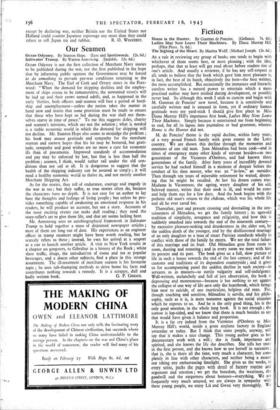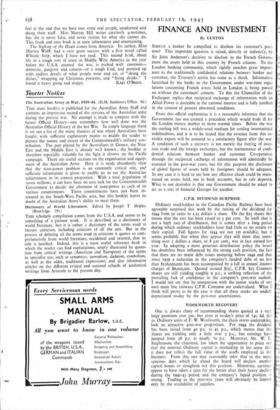Fiction
Home is the Hunter. By Gontran de Poncins. (Gollancz. 7s. 6d.) Ladies May Now Leave Their Machines. By Diana Murray Hill. (Pilot Press. 7s. 6d.)
The Sighing of the Heart: By Maritta Wolff. (Michael Joseph. 12s. 6d.) As a rule in reviewing any group of books one tends to begin with whichever of them seems best, or most pleasing ; with the idea, perhaps, that that at least will get read about before readers tire of one's article. And usually a reviewer, if he has any self-respect at all, tends to believe that the book which gave him most pleasure is, in fact, the best of its batch, objectively the best—the best written, the most accomplished. But occasionally the immature and literarily careless writer has a natural power to entertain which a more practised author may have mislaid during development, or possibly never had. So although this week I stick to custcm and begin with M. Gontran de Poncins' new novel, because it is sensitively and carefully written and is unusual in form, yet if ordinary human gratitude were my yard-stick I should give first place to Miss Diana Murray Hill's impetuous first book, Ladies May Now Leave Their Machines. Simply because it entertained me from beginning to end, for all its lapses into journalese or bad grammar, whereas Home is the Hunter did not.
M. de Poncins' theme is the rapid decline, within forty years, of a very proud French family with great estates in the Loire country. We are shown this decline through the memories and emotions of one old man. Jean Menadieu had been cook—and in times of emergency many other kinds of servant besides—to two generations of the Vicomtes d'Ombres, and had known three generations of the family. After forty years of incredibly devoted service he had sacked himself in a moment of despair before the conduct of his then master, who was an " in-law," an outsider. Then through ten years of miserable retirement he waited, dream- ing that he might be recalled. At last his dream comes true. Madame la Vicomtesse, the ageing, weary daughter of his old, beloved master, writes that their cook is ill, and would he come and help them out for a few days. And the book begins with the pathetic old man's return to the château, which was his whole life and all he ever cared for.
Thereafter, past and present crossing and dovetailing in the con- sciousness of Menadieu, we get the family history ; its ages-old tradition of simplicity, arrogance and religiosity, and how this is suddenly smashed into towards the end of the nineteeth century— by excessive pleasure-seeking and drunkenness in the elder son, by the sudden death of the younger, and by the disillusioned marriage of an only daughter to a man of smart Parisian standards wholly in conflict with those of the family he enters. We see the total failure of this marriage and its fruit Old Menadieu goes from room to room, dusting and restoring • and in every room we meet with him its present and its past. The book gives us a full, slow picture of life in such a house towards the end of the last century, and of the customs and traditions of its dependent countryside ; and it gives us for accompanying panel the sudden decline in such society—in servants as in masters—to sterile vulgarity and self-indulgence. Well-written, melancholy and full of just observation, the book is depressing and monotonous—because it has nothing to set against the collapse of one way of life save only the heartbreak, which brings him near to suicide, of one inarticulate, helpless old man. For, though touching and sensitive, Menadieu is servile, and his philo- sophy, such as it is, is mere nonsense against the social situation which he exposes to us. And he is the only good thing, his is the only good emotion, in the whole long book. It is not enough ; the sorrow is lop-sided, and we know that there is much besides to say that would have given it balance and proportion. It is a far cry indeed from the Vicomtes d'Ombres to Miss Murray Hill's world, inside a great airplane factory in England yesterday or today. But I think that some people, anyway, will say that it makes a nice change. This young author goes to her documentary work with a will ; she is frank, impetuous and spirited, and she knows the life she describes. She tells her story in the first person, and she knows how to use herself in narrative ; that is, she is there all the time, very much a character, but com- pletely in line with other characters, and neither being a mouse nor taking any embarrassing limelight. She gives us the works, in every sense, packs the pages with detail of factory routine and argument and emotion ; we get the boredom, the weariness, the goodwill and the eargerness about bonuses—everything. We are frequently very much amused, we are always in sympathy with these young people, we enjoy Lil and Gwen very thoroughly. We
feel at the end that we have met some real people, unadorned and doing their stuff. Miss Murray Hill writes carelessly %ometimes, but she is never false, and never strains for what she cannot do. This frank and easy book is at once informative and entertaining.
The Sighing of the Heart comes from America. Its author, Miss Maritta Wolff, had a very great success with a first novel called Whistle Stop, which I have not read. This second book, about life in a tough sort of town in Middle West America in the year before the U.S.A. entered the war, is packed with emotions— domestic, gangster and cabaret—of a tough kind, and prettied up with endless details of what people wear and eat, of "doing the dishes," wrapping up Christmas presents, and "fixing drinks." I found it heavy going and sloppy. KATE O'BRIEN.



























 Previous page
Previous page